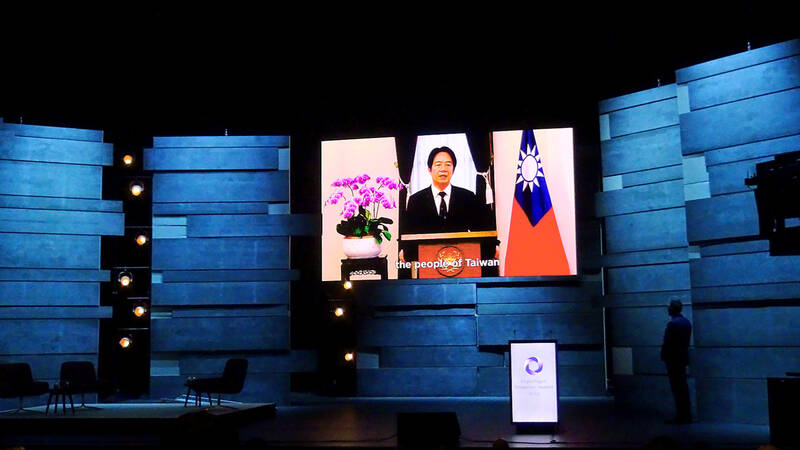Taiwan is open to dialogue with China, president-elect William Lai (賴清德) told the Copenhagen Democracy Summit on Tuesday, just days before he is to take office.
“I will not rule out dialogue with China on the principles of mutual respect, mutual benefits and dignity,” Lai said in a prerecorded video, adding that dialogue should be conducted “with no preconditions.”
President Tsai Ing-wen (蔡英文) has made similar appeals for official engagement with China, to no avail.

Photo: CNA
Beijing has insisted on Taipei accepting the so-called “1992 consensus” as a prerequisite for dialogue.
The “consensus,” a term former Mainland Affairs Council chairman Su Chi (蘇起) in 2006 admitted making up in 2000, refers to a tacit understanding between the Chinese Nationalist Party (KMT) and the Chinese Communist Party that both sides of the Strait acknowledge there is “one China,” with each side having its own interpretation of what “China” means.
Lai, who is to be inaugurated on Monday next week, said that his administration “will work to safeguard the status quo” in the Taiwan Strait.
The people of Taiwan “stand at the forefront of the fight against authoritarian expansion,” as they face pressure from foreign disinformation, military threats and economic coercion, he said.
“Despite Beijing’s efforts, the people of Taiwan have rejected authoritarianism,” he said. “China’s coercion has only strengthened our resolve to remain democratic and free.”
In the face of those challenges, Taiwan must continue to bolster its defense capabilities and enhance its economic resilience, he said.
“Our economic strength is crucial... The free world must prevail in the global competition in critical technological fields,” Lai said, pledging to work toward making Taiwan a “hub of the global democratic technology alliance.”
He did not elaborate.
Tsai, who is to step down after serving two four-year terms, also addressed the summit in a separate prerecorded video in which she said: “The people of Taiwan are more determined than ever to safeguard democracy and freedom.”
Taiwanese have dealt with “much intensified threats and intimidation” from China on a daily basis “with resilience and courage,” Tsai said, accusing China of engaging in hacking, cyberattacks and military intrusions against Taiwan.
“Neither threats nor coercion will shake Taiwan’s resolve to engage with the world,” Tsai said. “Taiwan and its people stand ready to strengthen cooperation with democracies around the world in all areas where we share mutual interests.”
Partnerships Taiwan maintains with like-minded countries will be “the most effective defense of all,” she said.
Taiwan remains ready to share its best practices on countering authoritarian influence with its partners, she said, while underlining the country’s commitment to supporting democracies around the world.
The two-day summit, which ended yesterday, sought to bring together political, business and media leaders, as well as rights advocates to defend the values of freedom and democracy.
Other speakers who addressed the event included European Commission President Ursula von der Leyen, former US secretary of state Hillary Rodham Clinton and Danish Prime Minister Mette Frederiksen.

CHAOS: Iranians took to the streets playing celebratory music after reports of Khamenei’s death on Saturday, while mourners also gathered in Tehran yesterday Iranian Supreme Leader Ayatollah Ali Khamenei was killed in a major attack on Iran launched by Israel and the US, throwing the future of the Islamic republic into doubt and raising the risk of regional instability. Iranian state television and the state-run IRNA news agency announced the 86-year-old’s death early yesterday. US President Donald Trump said it gave Iranians their “greatest chance” to “take back” their country. The announcements came after a joint US and Israeli aerial bombardment that targeted Iranian military and governmental sites. Trump said the “heavy and pinpoint bombing” would continue through the week or as long

TRUST: The KMT said it respected the US’ timing and considerations, and hoped it would continue to honor its commitments to helping Taiwan bolster its defenses and deterrence US President Donald Trump is delaying a multibillion-dollar arms sale to Taiwan to ensure his visit to Beijing is successful, a New York Times report said. The weapons sales package has stalled in the US Department of State, the report said, citing US officials it did not identify. The White House has told agencies not to push forward ahead of Trump’s meeting with Chinese President Xi Jinping (習近平), it said. The two last month held a phone call to discuss trade and geopolitical flashpoints ahead of the summit. Xi raised the Taiwan issue and urged the US to handle arms sales to

BIG SPENDERS: Foreign investors bought the most Taiwan equities since 2005, signaling confidence that an AI boom would continue to benefit chipmakers Taiwan Semiconductor Manufacturing Co’s (TSMC, 台積電) market capitalization swelled to US$2 trillion for the first time following a 4.25 percent rally in its American depositary receipts (ADR) overnight, putting the world’s biggest contract chipmaker sixth on the list of the world’s biggest companies by market capitalization, just behind Amazon.com Inc. The site CompaniesMarketcap.com ranked TSMC ahead of Saudi Aramco and Meta Platforms Inc. The Taiwanese company’s ADRs on Tuesday surged to US$385.75 on the New York Stock Exchange, as strong demand for artificial intelligence (AI) applications led to chip supply constraints and boost revenue growth to record-breaking levels. Each TSMC ADR represents

State-run CPC Corp, Taiwan (CPC, 台灣中油) yesterday said that it had confirmed on Saturday night with its liquefied natural gas (LNG) and crude oil suppliers that shipments are proceeding as scheduled and that domestic supplies remain unaffected. The CPC yesterday announced the gasoline and diesel prices will rise by NT$0.2 and NT$0.4 per liter, respectively, starting Monday, citing Middle East tensions and blizzards in the eastern United States. CPC also iterated it has been reducing the proportion of crude oil imports from the Middle East and diversifying its supply sources in the past few years in response to geopolitical risks, expanding